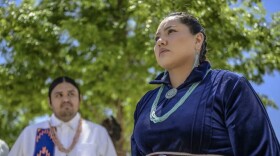A bill that would prohibit school boards from banning tribal regalia at graduation ceremonies unanimously passed its first committee on Tuesday.
The stems from an that happened last May in Farmington, NM. A Native American high school graduate was told to remove their embellished graduation cap that had an eagle plume and beads.
Farmington Municipal Schools later released a clarifying the district's policy that caps and gowns could not be altered. The student was given a generic cap for the remainder of the ceremony.
According to the Public Education Department’s 2023-2024 Tribal Education status , over 36,000 Native American students attended public schools in the state in the same year.
An by the Legislative Education Study Committee notes that “graduation is recognized as a significant milestone. The New Mexico Indian Affairs Department notes students often wish to wear items of cultural significance during their graduation ceremonies, as these items represent achievement, respect, and celebration.”
Josett Monette, New Mexico Secretary for the Indian Affairs Department (Turtle Mountain Band of Chippewa) told ��ɫ�� why wearing regalia is important for Native American students.
“It's our way of honoring the accomplishment. It's our family's way of honoring our accomplishments. And I think it means something to be able to represent who we are as Native people,” she said.
During the Senate Indian, Rural and Cultural Affairs Committee hearing, Sen. William Sharer (R-Farmington) suggested defining what regalia is and questioned whether this bill could affect the first amendment.
“What about other groups? I know this one clearly talks about Native American, but what if somebody wanted to support Christopher Columbus? What if somebody wanted to put a swastika on their head for First Amendment rights,” he said.
Bill co-sponsor Sen. Benny Shendo Jr. (D-Jemez) said the intent isn’t to exclude anybody but to reaffirm Native Americans students' sovereign rights.
“We're the only group of people as federally recognized tribes that are named in the Constitution. No other group of people is. That's why this relationship and what we do, we're not excluding anybody. We're exerting our right to be who we are, that this country identified from the very beginning,” he said.
Sen. William Soules (D-Doña Ana) recommended giving the bill an emergency clause so it would go into effect in time for this year's graduates in May.
Support from the coverage comes from the Thornburg Foundation.





